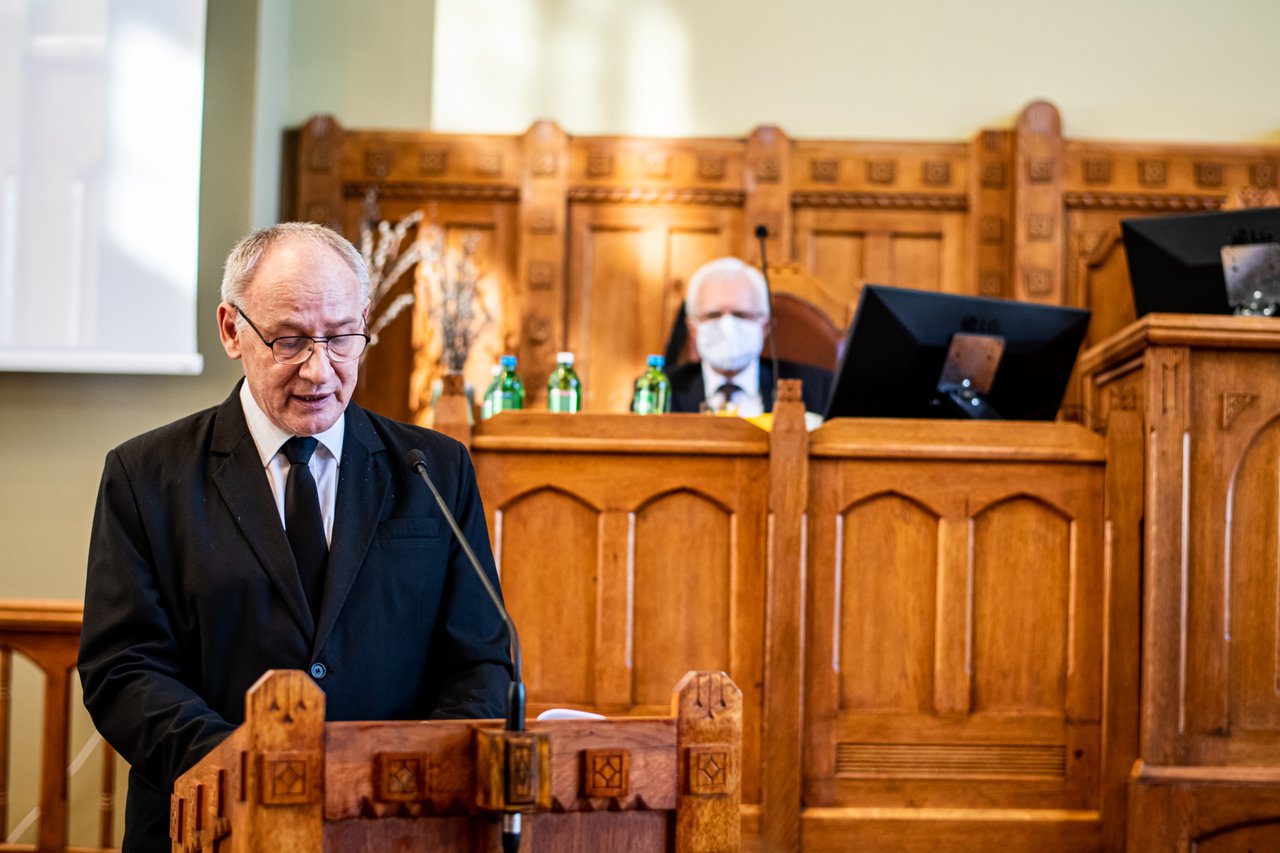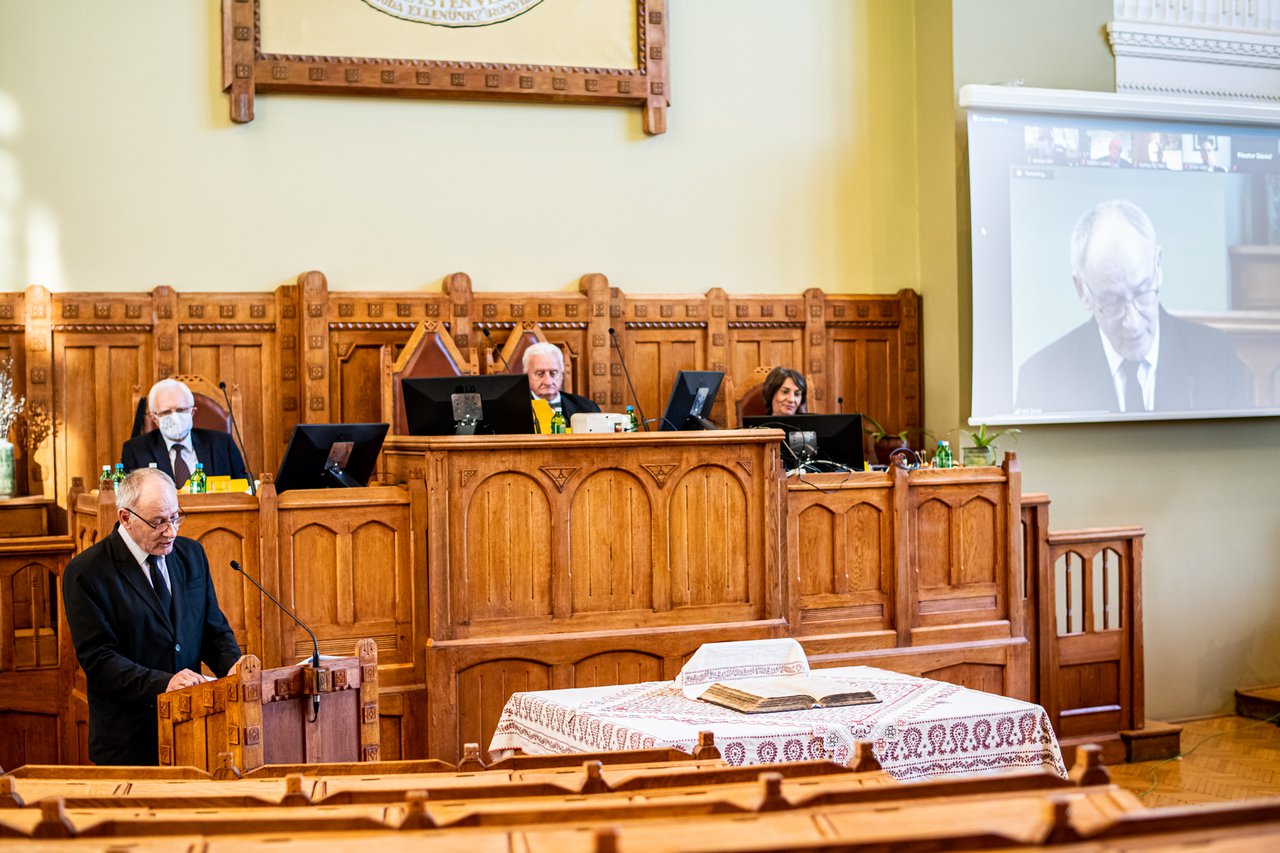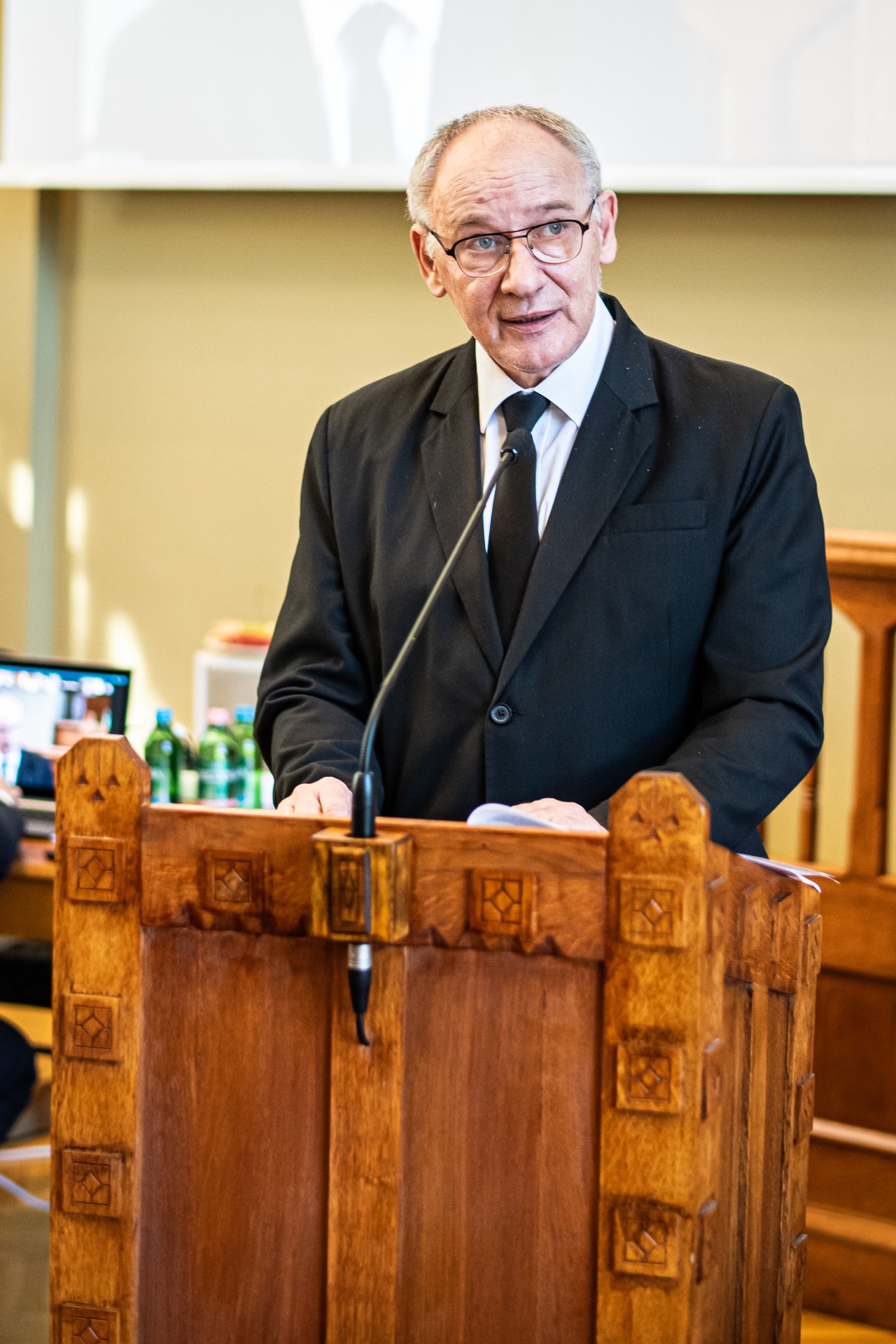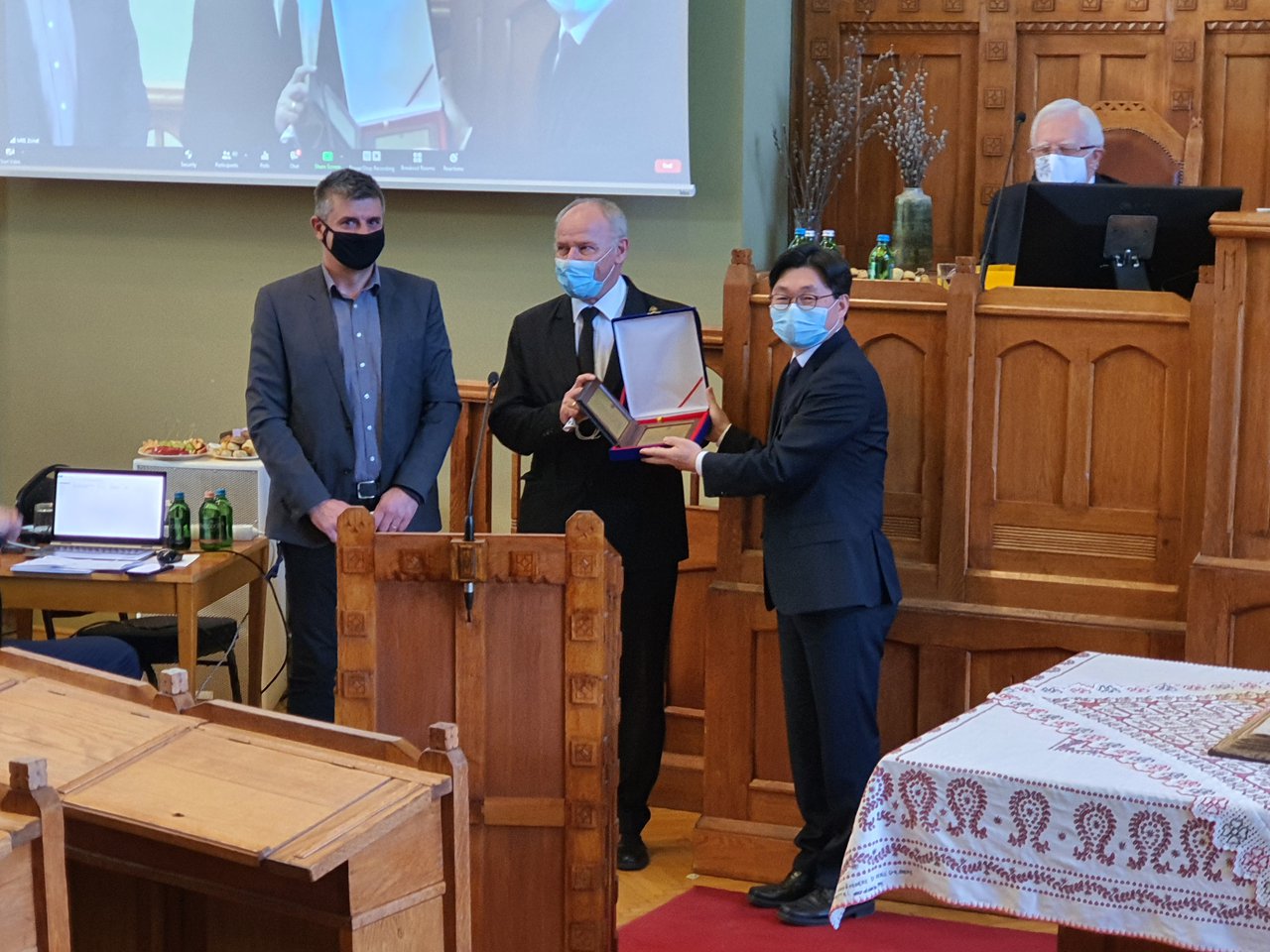At the closing Synod session, at its first ever online meeting on 18th November, members of the highest legislative body of RCH discussed a series of reports about results and achievements of various ministries and institutions in the past 6 years, and thanked for the service of the outgoing ministerial president, Bishop Dr. István Szabó. In his opening address, the Bishop talked about the effects of the coronavirus pandemic, the relationship between state and church, thanked the members of the synod, and commemorated those who died during the past 6 years. Talking about the future of our church, he warned that “we must not be ashamed of the cross of Jesus Christ”. Rev. Jeong Chae Hwa, pastor of the Korean speaking church of RCH, conveyed words of appreciation and gratitude on behalf of the worldwide ecumenical community.

Dr. István Szabó Bogárdi, outgoing Bishop of the Danubian Reformed Chruch Disctrict (Budapest) and Ministerial President of the Synod of the Reformed Church in Hungary opened the last meeting of the recent 6 years legistlative periode, the closing session of the so called 14th Synod Cycle. Rev. Szabó has been serving as Bishop of his Church District since 2013 and was elected as President of RCH in 2015. He has served 3 terms, altogether 18 years as Bishop. Although his term will end only at the end of the year, members of the Synod, senior officials and collegues have officially thanked and celebrated his dedicated service as a preacher of the Gospel, professor of theology and especially as the head of the church officially at the closing session today.
Are we still grateful to God?
Bishop Szabó challenged the members of the outgoing Synod with this critical question is his last opening address as President. “We conclude the six years period of this Synod and hand over the tasks to the incoming Synod (which will be constituted next February) in an extraordinary, but perhaps not unusual or unprecedented situation, hoping that our life in the country, in our congregations, in our institutions, in our schools, and here at the Synod, can soon return to ‘ordinary’,” he said. In his address, the Bishop reflected at length on issues and challenges that makes our present time extraordinary. He expressed his gratitude for the resistance and faithfulness of pastors and congregations during the ‘extraordinary’ weeks of lockdowns due to COVID-19 and reminded that RCH just recently had to switch to online worship services a second time during the pandemic.

Extraordinary times
Speaking of extraordinary or unusual phenomena of our time, the Bishop mentioned the multiple tensions within contemporary Christianity in general and the community of RCH specifically. As an example Szabó referred to the “liberation” of the church thirty years ago after the collapse of the Soviet empire when the church could breathe a sigh of relief. “We have been free since a generation now; we can freely practice our religion, we can fulfil our mission freely”. At the same time, we had to recognize that this formal and outer freedom comes with enormous risks, and a great deal of responsibility, especially regarding pure and uncompromised recognition of the “divine order of the church”. Freedom compels us to “courageously, truly and credibly proclaim the gospel and convey the invitation into God’s kingdom all over the place, to everyone, under all circumstances”. In this ministry we have to be aware of the “eternal rule” that Christians who are too quick to align and conform themselves to the expectation of the world will soon be “forced to falsify and misinterpret the divine truth”. This lapse can have different reasons, the most important being “ingratitude”. This tension presents an extraordinary challenge for the Christian community.
Inner and outer threads to Christianity
“I don’t want to point a finger at certain representatives of the so called ‘Western Christianity’ who often appear more to be social and political, moreover, ideological activists than being messengers of the Gospel … Therefore I better ask ourselves: have we kept the gratitude alive in our hearts for the God who brought us out of captivity?” Bishop Szabó also reminded the Synod members that according to cautious estimates there are between 200 and 300 million Christians in the world who are exposed to discrimination and harassment or suffer even life-threatening persecution. We have to keep them in our prayers and thoughts while we enjoy freedom in our ministry for the church. “We observe at the same time examples of Christians giving up their identity unsolicited and communities in minority, under great pressure and attack and aggression”, reminded Bishop Szabó concluding that the task of RCH is twofold: “admonishing with love and humility those who are slackening and supporting with all our might those oppressed”.
Unity and freedom
“The lesson of freedom is part of our own heritage”. The Bishop, speaking about the lessons on freedom we learned throughout our history and remembering the 100th Anniversary of the Peace Treaty in Trianon, recalled the liberating effect of the constituting Synod unifying the forcefully divided Hungarian Reformed Church. “It is a great joy that we have not wasted the chance of the freedom that God has given us, at least in this respect. The re-unification in Debrecen in 2009 was much more than an solemn and symbolic act”, which is reflected in the close cooperation of the Hungarian speaking Reformed churches in the Carpathian Basin, governed by the Presidium of the General Convent. The unity born out of the freedom to deliberate and act implies, again, a greater responsibility. “We are responsible not only for four Church Districts (in Hungary), but for ten (in and around Hungary)”, and we don’t only have diaspora communities in Hungary and the surrounding countries, whom we need to take care of, but also Vienna, Brussels and all around the world.

Ecumenical community and peace
“We have to re-learn the Christian fraternity,” reminded Bishop Szabó. Referring to the Reformation Jubilee in 2017, he emphasized how much church leaders have learned about cooperation in Ecumenical spirit. This involves both local ecumenical cooperation and international fellowship with partner churches, whose representatives attended and contributed to the opening ceremony of the Jubilee Year in Hungary, commemorating also the 450th Anniversary of the existence RCH.
“I do not know where the path of the ecumenism will lead us, and RCH obviously doesn’t play a decisive role in the ecumenical dialogue and cooperation. But I know for certain that following Christ will continue to be the deciding question and remain the core criterion for the authenticity of our ministry.” The Bishop reminded the members of the Synod of the distress and hardship in the world overshadowing faithful ministry on Christ’s footstep.
Our age is not at all ‘extraordinary’ regarding the unfortunate reality of the sinful world which is stuck in adversary and war ravaging so many countries and regions. Peace that seemed to be lasting just a few years ago, collapsed in many places, forcing millions of people to leave their homes and making them refugees. “Delegations of our synod paid visits in affected countries in the past years, for example, in Syria, which was ravaged by the civil war, or the divided Korean Peninsula, where there is no peace, just a ceasefire ... It is an extraordinary gift that Hungary has been living in peace for decades,” he said referring also to the constant threat of war in Ukraine. “Let us not cease to pray fervently for peace,” concluded the Bishop his last speech as President of RCH.
International appreciation
Although, due to the Coronavirus pandemic, ecumenical delegates were not able to attend the Synod meeting this time, on behalf of the International community and ecumenical partners, Rev. Jeong Chae Hwa, senior pastor of the Korean Reformed congregation in Budapest expressed his gratitude for the Bishop’s ministry and „passion and devotion to proclaiming the Good News of Jesus Christ, to uniting for global churches”. Rev. Jeong, as a symbolic gesture of ecumenical recognition, handed over the Plaque of Appreciation signed by Rev. Dr. Chang-bae Byun, General Secretary of the Presbyterian Church of Korea to honour the outgoing Bishop.

"In recognition of your passion and devotion to proclaiming the Good News of Jesus Christ, to uniting for global churches, I would like to express our sincere appreciation for your commitment as Bishop of Danubian Reformed Church District (2003-2020) and Presiding Bishop of the Reformed Church in Hungary (2015-2020) for last eighteen years. In addition, Bishop. Dr. István Szabó contributed to conclude the Missionary Agreement with the Presbyterian Church of Korea (PCK) in 2006 and to approve that Budapest Korean Presbyterian Church entered into Reformed Church in Hungary in 2012 as the first foreign church after being approved the Hungarian Religious Law. We keenly remember your dedication to serving churches in Hungary and Korea with Christian faith and love. As a token of our appreciation for your service, I hereby present this plaque to you."
„How beautiful on the mountains are the feet of those who bring good news, who proclaim peace, who bring good tidings, who proclaim salvation, who say to Zion, “Your God reigns!” (Isaiah 52:7)
The November meeting of the Synod marks the end of the 14th Synod cycle. The Church is in the process of nominating and electing new leadership from the local level up through the Synod, the RCH's highest decision-making body. Deans and chief elders of the 27 presbyteries, Bishops and Lay Presidents of the 4 Church Districts (with headquarters in Budapest, Debrecen, Miskolc and Pápa) are being also be elected in the months long process. The constituting session of the new Synod will meet in February 2021 and elect the new - ministarial and lay - Presidents. The Presiding Bishop will be elected out of the four Bishops who will be in office than. Read more about the procedure.